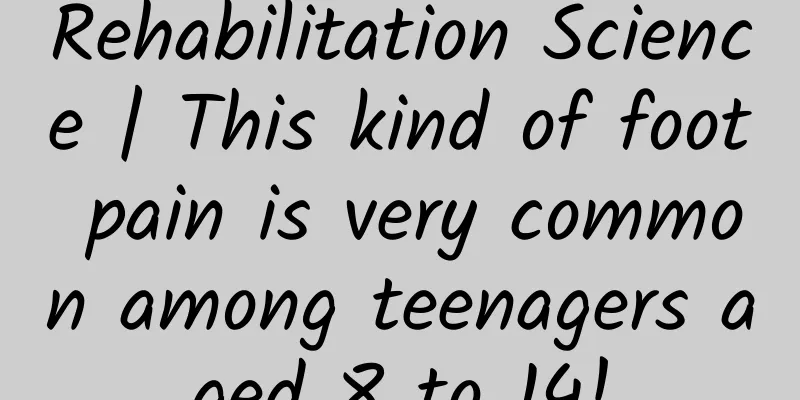Rehabilitation Science | This kind of foot pain is very common among teenagers aged 8 to 14!

|
Have you heard of "Sever's disease"? Sever's disease (calcaneal apophysitis) Sever's disease (calcaneal apophysiitis), also known as Sever's disease or Haglund's disease, is an orthopedic disorder affecting children and adolescents that manifests as avascular necrosis of the calcaneal epiphysis. Sever's disease is actually a type of "growing pains" that usually affects teenagers between the ages of 8 and 14. In simple terms, it is a painful problem that occurs in the back of the heel (calcaneus). Because the heel bone does not fully develop until at least age 14, before this time, new bone forms at the growth plate (epiphysis), which is a weak area at the back of the heel. Especially during the growing teenage years , the Achilles tendon is under increasing pressure. Especially for teenagers who like running and jumping, the Achilles tendon will repeatedly pull on the growing heel bone , which may cause inflammation and pain over time. Main symptoms (1) Heel pain, especially after exercise. (2) Sometimes it feels like walking on nails. (3) The skin on the heel may feel a little swollen. How to diagnose During physical examination, there may not be obvious redness or swelling in the affected area, but pain often occurs when the heel bone is squeezed. The diagnosis of this disease mainly depends on the physical examination and medical history of the child. X-rays are mostly normal, and MRI can occasionally show mild bone marrow edema in the calcaneal epiphysis, but it may also be non-specific, so auxiliary examinations are not necessary. Prevention and treatment Treatment focuses on reducing pain and swelling . Usually, your child needs to limit the amount of exercise they can do without discomfort or significant pain. Severe cases may require rest for several months before reintroducing strength training. Rehabilitation 1. Exercise therapy When the pain is relieved or pain-free, calf muscle flexibility exercises and strength exercises should be strengthened, and balance function and proprioception training should be performed to maintain muscle strength balance. (1) Moderate Achilles tendon stretching to prevent Achilles tendon contracture, 15 times/set, 3 sets/day. (2) Strengthen the muscles around the ankle joint: Perform progressive resistance training of ankle dorsiflexion and ankle plantar flexion according to the patient's tolerance and clinical symptoms, 15 times per set for each movement, 3 sets per day. (3) Balance function and proprioception training: Balance function training can be performed by shifting the center of gravity in front of a glass mirror. Balance and proprioception training can also be performed by walking in a straight line, walking on a soft cushion, walking on a balance beam, walking on unstable ground, etc. to improve stability when walking. 2. Physical factor therapy Infrared, wax therapy, ultrasound, microwave, etc. can soften and loosen local tendon contracture, promote the absorption of local inflammatory edema, reduce muscle tension, increase local pain threshold, and have an antispasmodic and analgesic effect. 3. Orthopedic insoles Orthotic insoles can provide additional support and cushioning for the heel bone and relieve pain. By adjusting the force distribution on the sole of the foot, it can reduce the excessive pressure on the heel bone due to exercise or daily activities, especially relieving the traction of the Achilles tendon on the calcaneal epiphysis. Precautions (1) Get adequate rest to reduce irritation to the heel. (2) Symptoms usually improve with rest and do not require surgical treatment. (3) Avoid obesity. (4) Choose well-structured, supportive shoes or insoles that are suitable for your child’s activities. (5) Avoid or limit wearing sports shoes with spikes. 【END】 |
<<: 【Health Lecture】About chest pain: pleurisy
>>: China CDC: Currently more than 99% of influenza viruses are influenza A! Urgent reminder →
Recommend
Will ovulation occur on the third day after menstruation?
After menstruation is over, ovulation generally d...
Do I need to wear underwear over a panty-type sanitary napkin? How do I tell the front and back of a panty-type sanitary napkin apart?
People's living standards are improving, and ...
What are the techniques for conceiving with unilateral fallopian tube?
The eggs produced by a woman's ovaries need t...
Is the saddle uterus natural?
The uterus is the organ that women use to give bi...
A woman starts sweating immediately after waking up
Some women sweat a lot after waking up every day....
What are the clinical manifestations of gynecological diseases?
The female private parts are delicate and sensiti...
What are the symptoms of gynecological inflammation after fire therapy?
Fire therapy is a traditional Chinese medicine ph...
Can I wear makeup after the confinement period?
During pregnancy and confinement, many girls are ...
At what level of insomnia do you need to take sleeping pills? Will you become addicted?
Expert of this article: Li Xue, Peking Union Medi...
Can I get pregnant six months after induced abortion?
In real life, some women have had induced abortio...
People who blush when drinking alcohol are more likely to develop stomach cancer!
Recently, a study published in Science Advances s...
How many days does it take to stop breastfeeding after taking Hui Nai Bao?
Most mothers will have trouble producing milk aft...
The whole family scratched together, it turned out that "eczema" was the problem
A new mother from Huairou, Beijing, brought her s...
Why haven't you had your period for two months?
During puberty, both males and females begin to d...
I feel chest tightness and hiccups in my 7th month of pregnancy, but I feel much better. What's going on?
Women must take good care of their bodies during ...









